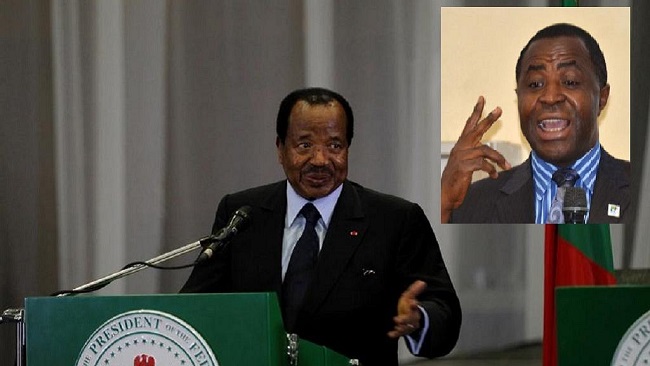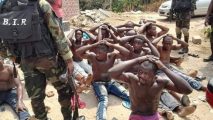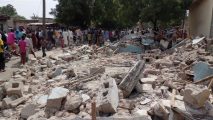14, May 2019
Inside Cameroon’s civil war 0
In Cameroon, civil war is brewing along linguistic lines. Its origins lie in the botched decolonization of the country’s anglophone territory, but President Paul Biya’s repressive regime has poured fuel on the fire. Lorraine Mallinder reports.
Lucy speaks of her last day in her village of Mbonge with arresting clarity. The 64-year-old was cooking plantains to sell by the roadside when soldiers came sweeping in to root out separatist rebels known as Amba Boys. She remembers the rat-a-tat-tat of machine guns and the screams of villagers scattering ‘helter-skelter’ – many fleeing to the bush, shot in the back as they ran. ‘Whosoever the bullets met, the people died,’ she says.
Mbonge is in Cameroon’s anglophone southwest. The soldiers were with the Rapid Intervention Battalion (BIR), an elite Israeli- and US-trained corps deployed by the francophone regime to crush an anglophone uprising in the northwest and southwest regions. In Douala, a port city just over the border from anglophone Cameroon, countless people who have fled the conflict tell similar stories: of security forces shooting indiscriminately, torching homes and sometimes entire villages in their determination to snuff out the separatist threat.
Some call it the ‘anglophone problem’, others ‘the war’. Semantics can be blurring, but the numbers don’t lie. At least 1,600 people have lost their lives, according to the International Crisis Group (ICG). Caught between government forces and the Amba Boys, nearly half a million have fled their homes, many trapped in the bush, terrified of returning to their villages but unable to seek refuge in the towns, often because they don’t have ID cards. Wary of being seen to take sides in a conflict that is becoming deadlier by the day, NGOs struggle to get food and medical assistance to those in need.
Colonel Didier Badjeck, chief of army communications, terms the regime’s actions as ‘legitimate defence’. The military, he claims, is targeting the Amba Boys – the nickname a reference to the separatists’ self-declared independent state of Ambazonia – in their rural camps, minimizing the risk of civilian deaths. He accuses groups like Human Rights Watch (HRW), which has reported on military abuses, of supporting the separatists. These groups, he says, are ‘compromising the country’s honour’.
One NGO source says otherwise. The BIR, he says, has a ‘licence to kill’. And it wields it liberally, with utter impunity.
At first sight, the musket-bearing Ambas would appear to be no match for the mighty BIR and its high-tech Israeli rifles. But the BIR and its lowlier army counterparts are unaccustomed to cat-and-mouse games of guerrilla warfare. And the mice are proving especially nimble, a rag-tag of around seven separatist militias and an unknown number of smaller cells, according to ICG, who know the dense forests like the backs of their hands. More importantly, the separatists have the support of the people, for even if they themselves have been guilty of killings and torture, anger at military excesses is reaching boiling point.
In recent speeches, President Paul Biya has paid lip service to bilingualism and decentralization, but he fails to convince. Lion Man, as his supporters call him, has not survived 36 years in power by making compromises. So confident is he of his cast-iron grip on the country, maintained through paralysing bureaucracy, entrenched patronage networks and legal witch-hunts against political opponents, that he can afford to chillax at length in Geneva every year. Meanwhile, in the sealed-off anglophone regions, the conflict rages on, far from the world’s view.
‘The way things are going now, the situation will be endless,’ says the NGO source.
The devil comes in
In Buea, capital of the southwest, we meet human rights lawyer Agbor Nkongho. In 2016, Nkongho led lawyers and teachers in protests against the government’s efforts to enforce the use of French in anglophone courts and classrooms. The regime responded with shooting from the air and on the ground, locking up protesters it labelled as ‘terrorists’. Today, an estimated 800 to 1,000 people are in prison, many of them moderates. What had started out as a civil rights protest soon spiralled into a full-blown conflict. The government’s brutal response mainstreamed separatist sentiment that had been simmering for decades.
The conflict has its roots in the botched decolonization of Cameroon in the 1960s. Formerly a German colony, it was carved up between the British and the French after the First World War. While French Cameroon gained independence in 1960, the smaller British Cameroons were denied a shot at self-determination. Instead, they had to choose between joining Nigeria or French Cameroon. The northern zone went with the former, the south opting to be folded into French Cameroon. The fledgling federal state started with two stars on its flag, symbolizing the union. But in the early 1970s, two stars became one. Francophones, who make up around 80 per cent of the population, now called the shots. The anglophone regions, rich in oil and other natural resources, were sidelined into near-insignificance.
A federalist at heart, Nkongho is caught in the middle. Jailed by the regime for eight months, he has also received death threats from separatists. Nkongho is critical of the Amba Boys, who chop off the fingers of workers ignoring strikes, torture teachers defying their boycott on schools and kill anyone suspected of collaborating with the state. As the territory descends into chaos, rival diaspora leaders in the West who are funding the two main militias – the Ambazonia Defence Forces and the Ambazonia Self-Defence Council – continue to maintain a hard line. In their battle for supremacy, their fighters occasionally clash in the bush. ‘If they’d pulled together, they could have obtained territory and controlled it,’ says Nkongho. ‘If they were really organized, they would open schools and teach the kids their history.’
There have also been kidnappings, notably November’s Boko Haram-style seizure of 78 schoolchildren and three staff members from a school in Bamenda, capital of the northwest. It took place during a strictly enforced dusk-to-dawn curfew, causing many to question how the group cleared checkpoints on their 19-kilometre journey to the town of Bafut, where the hostages were later released. Separatists and the government blamed each other, the former claiming the abduction was staged to damage their reputation. On the ground, the jury is still out. Courage, a teacher from Bamenda, says the children themselves are still giving conflicting stories.
In the anglophone regions, people now speak of ‘real Ambas’ and ‘fake Ambas’ – the latter covering anything from alleged state-sponsored mercenaries to the gangs of bandits now roaming the land. ‘When you have a house that is always quarrelling, the devil outside realizes and comes in,’ says Brenda, a civil rights activist from Mamfe, in the southwest.
In February, the conflict spiked during a 10-day lockdown. In the northwestern town of Kumbo, 176 people – mostly schoolchildren – were kidnapped and released the next day amid rumours of ransoms. Kumbo was especially volatile, security forces burning houses and shops, and threatening hospital staff, according to HRW. In the southwest, a hospital in the town of Kumba was burned, killing four people. Nobody knows who did it, but military attacks on hospitals are not uncommon. Wounded locals often resist being admitted for treatment for fear of being hauled out by soldiers.
Nkongho estimates that around 30 people lost their lives during February’s violence.
Gerontocracy
The first casualty of war is truth, they say. Especially in a country where journalists risk being hauled before a military court for doing their job, increasingly on charges of ‘fake news’. Currently there are four journalists from anglophone Cameroon in jail, three of whom are known to be in Yaoundé’s notorious Kondengui Prison. One, Thomas Awah Junior, of Afrik 2 Radio, is critically ill.
Journalist Mimi Mefo attracted worldwide support when she was arrested in November 2018. Released on the orders of President Biya, she was warned that the military would eventually get her. Living in permanent fear, she continued to work, threatened by online trolls whom she suspected of being government agents. Now in London, she believes she will be arrested again if she returns.
‘Many journalists are now doing self-censorship,’ she says. ‘The government doesn’t want the story of Cameroon to be told.’
The story of Cameroon right now is one of a gerontocracy holding ever-tighter on to power, crushing the country in its death grip. Anglophones are not alone in their opposition to a government that has over-stayed its welcome – possibly by 26 years. Many Cameroonians believe Biya stole victory in the 1992 elections from John Fru Ndi – an anglophone, as it happens.
History repeats itself endlessly here. Biya, now 86, was re-elected for a seventh mandate last year, amid allegations of fraud. Though, as one diplomat in Yaoundé notes wryly, the outcome was already baked into the system. The opposition organized protests, which ended in mass arrests, including the jailing of opposition leader Maurice Kamto in January. Potential rivals for power are regularly locked up. Cameroonians like to joke that an entire parallel government resides in prison, given the numbers of former high-ranking officials incarcerated.
Observers wonder whether the anglophone conflict will prove to be the regime’s unravelling. Aside from being a drain on state finances, it is now hitting export crops like bananas, rubber, cocoa and coffee hard. And it’s not as if the regime doesn’t have other problems to contend with. Up in the far north, the war on Boko Haram jihadists drags on into its fifth year. And in the east, troops are battling armed gangs from the war-torn Central African Republic.
Diplomatically, the country is under strain. Traditionally a stable foothold in Central Africa, it has long escaped international criticism. But last year, it was stripped of hosting the 2019 Africa Cup of Nations, partly owing to security concerns. And, this year, the US scaled back military aid, citing concerns over human rights violations. It’s unclear whether the move was in response to abuses in the anglophone regions or in the far north, where soldiers have also wielded their ‘licence to kill’ with reckless abandon. Either way, it came as a blow to the regime.
The President is fighting back, employing the services of Glover Park Group, a Washington DC-based lobbying and communications firm. In the anglophone regions, people despair that the narrative is going Biya’s way, the state asserting its right to crush ‘terrorists’ and ‘criminals’, who often turn out to be innocents. NGOs at the mercy of capricious bureaucrats who can withhold passes dare not speak of the abuses they witness lest they lose access to the conflict zone.
One international aid worker, who is assisting people in the bush, agrees that Biya may be winning the PR war. ‘But that’s the only war he’s winning,’ he says. ‘The military know that brute force is not going to win the conflict. You can’t catch so many people hidden in the population.’
‘On the ground people are blaming the government,’ says one journalist in Buea. ‘The people are fed up. The government has failed.’
Culled from New Internationalist





























14, May 2019
Ambazonia: Vice President Dabney Speaks of his Vision, his Health and the way Forward 0
Following his appointment as the Vice President of the Federal Republic of Ambazonia, Cameroon Concord News Group congratulated Dabney Yerima and judged it wise for our readers to get first-hand information about this new C0-driver of the Southern Cameroons revolution train. Vice President Dabeny cautioned our correspondent not to address him as VP but simply as Comrade. Below is the full conversation with the Southern Cameroons new strongman
Cameroon Concord News Thank you very much Mister Vice President for accepting to talk to us. A new page in the struggle and a new challenge for you and your family
Dabney Yerima: My dear journalist, titles aren’t essential or important now. The central people in this struggle are the families in the forests, the refugees in Nigeria, the IDPs, the Restoration Forces and Ground Zero not titles. These title cancers in the diaspora have made us lost our focus! We need to refocus. It is my belief that every struggle goes through phases and we have gone through a difficult one recently.
Regarding the second part of your question, I wish and must say here that this is not my family struggle; this is the people’s revolution. It’s not about me or President Sisiku Ayuk Tabe!! It’s about the people of Southern Cameroons.
Cameroon Concord News Many Ambazonians agree with you that the Southern Cameroons Diaspora has been consistently inconsistent! What should be expected in the coming days?
Dabney Yerima My vision is to get all the focus on Ground Zero. You and I are very much aware that diplomacy is a slow process but we must never give up whilst doing all we can to help our people defend themselves. My goal is to use this trust conferred upon me by President Sisiku Ayuk Tabe to build bridges and to get us to refocus and direct our dynamism where it matters most. Accountability and trust are earned and not dished out like kola nuts. I also will work extremely hard to build an IG that respects Ambazonian state institutions and the constitution of the State.
Cameroon Concord News A lot of tongues have been wagging ever since President Sisiku Ayuk Tabe made public the decision appointing you as Vice President! Who is Comrade Dabney Yerima?
Dabney Yerima I was born into a traditional Northern Zone family that till this day exhumes hard-work and enthusiasm. I attended Sacred Heart College Mankon and Cameroon Protestant College Bali both in Southern Cameroons before travelling to Holland over twenty years ago. I am a family man with two beautiful kids.
Cameroon Concord News Southern Cameroonians in Europe are saying that you are not a stranger to the complexity and direction of the Ambazonia debate and struggle. Is this true?
Dabney Yerima President Sisiku Ayuk Tabe pointed out to me some time ago that whenever a man is over praised, there is the danger of him becoming arrogant, so I will always check myself when dealing or reacting to what the public is saying about me. Formerly I worked as the Acting Secretary General of the SCNC and also held positions in SCACUF. In the Ambazonian Interim Government, I served as the Under Secretary of State for Home Affairs and Resource Mobilization and before that at the DOD in the logistics Command Unit.
Cameroon Concord News We gathered from our intelligence department that you were struck down by a serious illness and was never expected to walk again or stay alive but you recovered. Talk us through that experience
Dabney Yerima As you rightly mentioned, I recovered and that’s an experience which I attribute to the grace of God. God in his infinite image has provided another opportunity for me to lead his people. I am strong and doing well and ready!! But I need the support of every Southern Cameroonian and most importantly you of the press.
Cameroon Concord New When do you intend to address the people of Ambazonia?
Dabney Yerima That decision has to come from the Communications Department of the Ambazonian presidency. I believe and fervently too that it will come soonest.
Cameroon Concord News Thank you very much for your time! Hope to have more of these conversations with you
Dabney Yerima It’s my pleasure Comrade
Interviewed by our London Bureau Chief Sesekou Asu Isong and published by Chi Prudence Asong